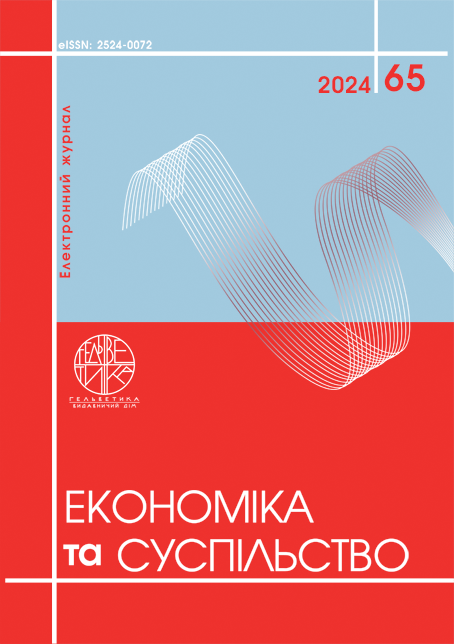GENDER EQUALITY IN LEADERSHIP
Abstract
The article addresses the issue of ensuring gender balance in management positions both in Ukraine and in the world. The main challenges include stereotypes about the role of women in society, insufficient support from the state and employers, and limited access to resources and careers. development opportunities. First, the article delves into the complex issue of gender balance in leadership roles, both nationally and globally. Drawing on data from the Global Gender Gap Report 2023, the article presents a clear picture of Ukraine's situation compared to other countries, particularly focusing on economic participation and opportunities. The article provides a comprehensive review of the various barriers women face, including pervasive gender stereotypes that limit women to traditional roles, limiting their aspirations and career opportunities. To provide a balanced view, the article also highlights successful examples and practices from various regions and industries that have made significant progress in promoting gender diversity in leadership positions. The article also discusses the systemic nature of these biases, which are often rooted in organizational cultures and policies. Another significant challenge is the lack of support from both the state and employers. Without an appropriate maternity leave policy, childcare support and flexible work arrangements, women find it difficult to reconcile professional and personal responsibilities, which in turn affects their professional development. The article also discusses the positive impact of gender diversity on business performance. Research shows that companies with diverse management teams are more likely to achieve better financial results than their competitors and are better prepared to innovate. The article highlights the importance of a multi-faceted approach to achieving gender balance in management positions. The article calls for a paradigm shift in the way societies perceive and value women's contributions in professional settings, calling on stakeholders to recognize that gender diversity is not only a moral imperative, but also a strategic advantage.
References
Rahman S., Ferdausy S., Uddin A. Exploring the Relationships between emotional Intelligence, leadership Styles and gender: an empirical study. SIU Journal of Management. Vol. 2, No. 2. December, 2012. P. 27–57.
Микитко О. Вплив гендерних стереотипів на статус жінки-лідера в сучасному українському суспільстві. Українська національна ідея: реалії та перспективи розвитку. 2010. Вип. 21. С. 132–135.
Галанець О. Управління гендерними процесами в державній політиці. Віче. 2009. № 6. С. 7–9.
Синякова В.Б. Ґендерні аспекти кар’єри. Науковий часопис Національного педагогічного університету імені М.П. Драгоманова. Серія 11 : Соціальна робота. Соціальна педагогіка. 2018. Вип. 24 (2). С. 231–236.
Оксамитна С.М. Ґендерні відносини крізь призму громадської думки в Україні і світі. Наукові записки НаУКМА. 2010. Т. 19. Спец. вип. Ч. ІІ. 179 с.
UN Women – Ukraine. URL: https://ukraine.unwomen.org/en/digital-library/publications
Policy Brief: A Gender Responsive Recovery for Ukraine: Introduction. URL: https://reliefweb.int/report/ukraine/policy-brief-gender-responsive-recovery-ukraine-introduction
Global Gender Gap Report 2023. URL: https://www.weforum.org/publications/global-gender-gap-report-2023/
Rahman S., Ferdausy S., Uddin A. (2012) Exploring the Relationships between emotional Intelligence, leadership Styles and gender: an empirical study [Exploring the Relationships between emotional Intelligence, leadership Styles and gender: an empirical study]. SIU Journal of Management. Vol. 2, December. P. 27–57.
Mykytko O. (2010) Vplyv hendernykh stereotypiv na status zhinky-lidera v suchasnomu ukrainskomu suspilstvi [The influence of gender stereotypes on the status of a female leader in modern Ukrainian society]. Ukrainska natsionalna ideia: realii ta perspektyvy rozvytku. Vol. 21, pp. 132–135.
Halanets O. (2009) Upravlinnia hendernymy protsesamy v derzhavnii politytsi [Management of gender processes in public policy]. Viche. Vol. 6, pp. 7–9.
Syniakova V.B. (2018) Genderni aspekty kariery [Gender aspects of career]. Naukovyi chasopys Natsionalnoho pedahohichnoho universytetu imeni M.P. Drahomanova. Seriia 11 : Sotsialna robota. Sotsialna pedahohika. Vol. 24 (2), pp. 231–236.
Oksamytna S.M. (2010) Genderni vidnosyny kriz pryzmu hromadskoi dumky v Ukraini i sviti [Gender relations through the prism of public opinion in Ukraine and the world]. Naukovi zapysky NaUKMA. 2010. T. 19. Spets. vyp. Vol. II. 179 p.
UN Women – Ukraine. Available at: https://ukraine.unwomen.org/en/digital-library/publications
Policy Brief: A Gender Responsive Recovery for Ukraine: Introduction. Available at: https://reliefweb.int/report/ukraine/policy-brief-gender-responsive-recovery-ukraine-introduction
Global Gender Gap Report 2023. Available at: https://www.weforum.org/publications/global-gender-gap-report-2023/

This work is licensed under a Creative Commons Attribution 4.0 International License.


